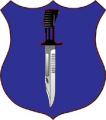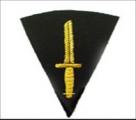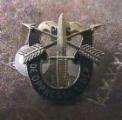In the 1930s handbook for British imperial officers, Imperial Policing, Maj. Gen. Charles Gwynn, who had seen action in both West Africa and Sudan, writes:
When armed rebellion occurs, it presents a very different military problem from that of a deliberate small-war campaign. There is an absence of a definite objective, and the conditions are those of guerrilla warfare, in which elusive rebel bands must be hunted down and protective measures are needed to deprive them of opportunities. The admixture of rebels with a neutral or loyal element of the population adds to the difficulties of the task. Excessive severity may antagonize this element, add to the number of the rebels and leave a lasting feeling of resentment and bitterness. On the other hand, the power and resolution of the government forces must be displayed. Anything which can be interpreted as weakness encourages those who are sitting on the fence to keep on good terms with the rebels.
Gwynn distinguishes the policing role of occupying powers from conventional warfare and even from asymmetric “small wars” against irregulars, which he defines as “deliberate campaigns with a definite military objective, but undertaken with the ultimate object of establishing civil control” and in which “[no] limitations are placed on the amount of force which can be legitimately exercised, and the Army is free to employ all the weapons the nature of the terrain permits.”[1] Pitched closer to civil governance, policing occurs where the government expects to continue ruling a population after hostilities have ended and, as such, wishes to avoid antagonizing the civilians from whom nascent rebel groups can recruit members and receive logistical and moral support.
The precise calibration of lethal force advocated in Imperial Policing is embraced as the primary tactic of contemporary counterinsurgency doctrine in the United States, as most clearly set out in the Counterinsurgency Field Manual (2006),[2] whose free Army-published online version has been downloaded by over 2 million people.[3] Since the Manual’s dissemination, which roughly coincided with the 2007 “surge” in Iraq, counterinsurgency doctrine has become a cottage industry with numerous admirers in the press corps. A key achievement of counterinsurgency doctrine, in fact, has been to bring the majority of American foreign and military affairs reporters back on board the careening bandwagon of Washington’s post-September 11 wars.
...





 Reply With Quote
Reply With Quote



 "A Sherman can give you a very nice... edge."- Oddball,
"A Sherman can give you a very nice... edge."- Oddball, 






Bookmarks